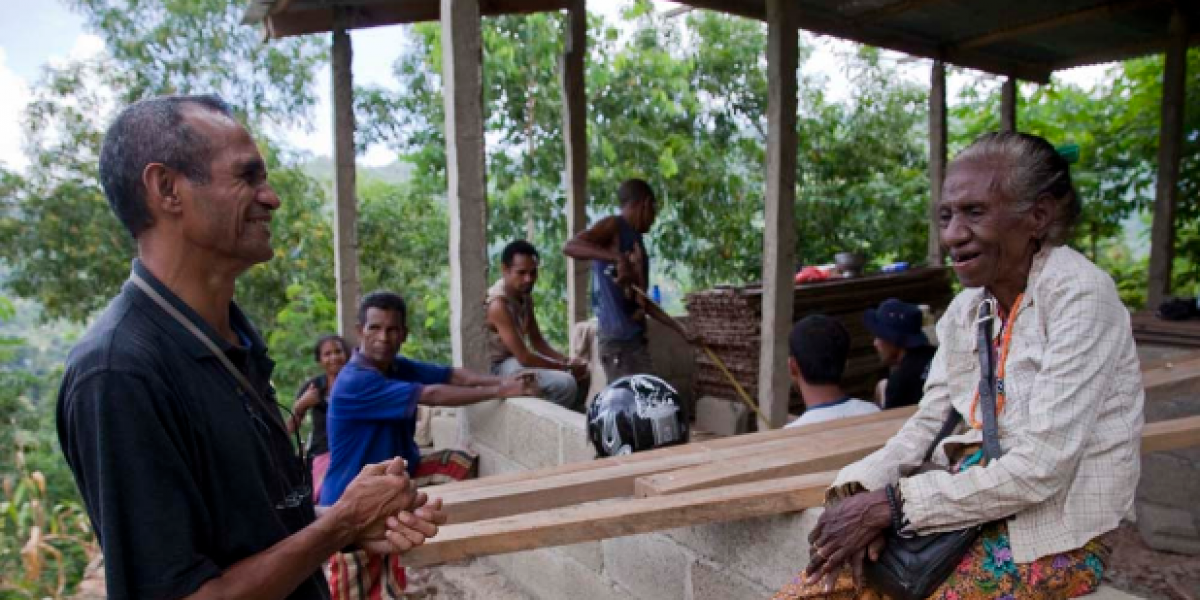Timor Leste: Village chief sees a path for community’s future
13 May 2011

Becora, 13 May, 2011 – Mr Antonio, is the chief of Becora village. Becora is one of four villages where JRS is implementing housing and capacity building programmes. Mr Antonio, reflects on the challenges faced in his Village.
Looking back, the 2006 and 2007 military crisis in Timor-Leste made many people suffer, not only vulnerable people but also many community leaders and authorities. Day after day and night after night, we had to respond to families, children and the elderly who were losing their homes as a result of the conflict with Indonesia. As local authorities, we were also forced to flee because we became targets.
Many NGOs, including JRS helped us with the difficult task of housing displaced people during and immediately after the fighting. Unfortunately many of these NGOs are no longer with us any more. However, I am thankful to all those people who assisted, even if it was for only a short period of time.
Now we have peace in Timor-Leste, but the situation will only remain peaceful if the community continues to work on community building and finds ways to integrate their ideas into new development programs. Catholic Relief Services (CRS) continues to work in three sub villages with the Culture for Peace Program and JRS is working in the village of Becora to strengthen local leadership and increase community participation in the process of peace and reconciliation.
Working towards rebuilding
JRS continued to help them solve residual problems such as conflict resolution until all of the IDPs returned home or moved to other authorised places.
Not every displaced person came to my village, but JRS continues to work with us because we received many IDPs from those camps. Now, the local officials, including myself, have a responsibility to both the villagers and the displaced people who have come to our village – if we start a program, we must ensure that program can sustain itself.
There is still a shortage of many basic necessities for our people, like infrastructure, health care and housing. We also lack official institutions that are able to assist people to find appropriate ways to solve their problems and help them to recognise their own potential and capacity.
Surviving in the city
Because of the war with Indonesia many people fled from the mountains to live in Dili, the capital city. Now we have our own government, our own laws, but these laws cannot solve the population’s basic problems like the ability for people to own their own home or to find employment.
Now with so many people living in the capital, the problems with housing extend beyond the surrounding villages. More than 60 percent of people living in Dili do not legally own their homes or legally live on their own land.
Either they live on private land or on State lands, and in private or State owned properties. Slowly, the owners of private property and the State are claiming this land to build new infrastructure, forcing many into homelessness.
JRS helped build five houses in our village for vulnerable people. JRS continues to work in our village by helping us consolidate our administration at the village and sub-village levels and register the population. This is an important task for us, as it will help us to identify and mobilise different groups in the community to carry out development activities.
The Counsel of Villages now meets regularly and many sub-village chiefs are able to develop proposals and submit them to the relevant government departments. Some programs are running with community participation; for example, drain cleaning in Clack Fuik sub-village, canal building in Malboro and Darlau sub-villages, bridge repair and maintenance in Romit sub-village and in Maucoco Mate sub-village.
While I am still concerned for the people in our village, surrounding villages and Dili, I feel encouraged to continue to build capacity of the people around me. We, as a community, must continue to strive for a better future.


